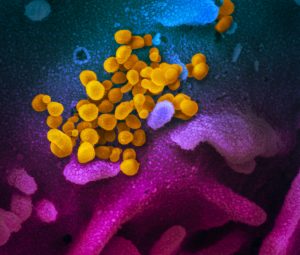Help us protect the commons. Make a tax deductible gift to fund our work. Donate today!
In response to the global health emergency caused by COVID-19, we’ve seen an array of organizations, publications, and governments make COVID-19 related research open access. For example, the U.S. National Library of Medicine recently released the COVID-19 Open Research Dataset (CORD-19)—a machine-readable coronavirus literature collection with over 29,000 articles available for text and data mining (TDM).

“Novel Coronavirus SARS-CoV-2,” by National Institute of Allergy and Infectious Diseases (NIAID), licensed CC BY.
These actions are not surprising given the urgency of the current situation. In our previous post, “Now Is the Time for Open Access Policies—Here’s Why” we explain that rapid and unrestricted access to scientific research and educational materials is necessary to overcome this crisis. However, while we applaud the recent moves by organizations, publishers, and governments to open access to scientific research related to COVID-19, we believe the same level of sharing should be applied to all scientific research. Not only for the public good but also for the good of science. Science can only function properly if results, data, and insights are made openly available. “Universality is a fundamental principle of science,” explains the open access consortium cOAlition S, “only results that can be discussed, challenged, and, where appropriate, tested and reproduced by others qualify as scientific.”
Put simply, open science is the best way to do science. This is why CC has consistently recommended the following best practices for sharing research openly:
- Zero embargo period so the public has immediate access
- CC BY on the article so it’s available for TDM
- CC0 on the research data so other scientists can scrutinize the conclusions, replicate the study, and advance the science
In order to examine this issue further, as well as provide some guidance for scientific researchers and organizations specifically, we reached out to intellectual property and copyright law expert Dr. Lucie Guibault, an associate professor at the Schulich School of Law and associate director of the Law & Technology Institute at Dalhousie University.
Our conversation below is slightly edited for clarity and length.
CC: Why does open access to scientific research and data matter in moments of crisis?
Dr. Guibault: When time is of the essence, like now with the COVID-19 pandemic, scientific research results must be made available as soon as possible so that other scientists, policymakers and the general population can rely on sound scientific data in their decision-making process. Contrary to the traditional publishing model, which puts scientific publications behind a paywall or puts a 6 to 12-month embargo on self-archiving (depositing scholarly research in an online repository or open archive), open access allows for immediate, worldwide access to scientific and scholarly publications. Actions based on new findings can be immediate. For example, open access to a broad corpus of articles can certainly help reduce duplication of work, but most of all it enables easy text and data mining (TDM) which leads to new insights and knowledge. Through TDM scientists can make predictions on where a virus will emerge, when it might peak, what drug might work, etc.
CC: Why do you think organizations are adopting open access policies and actions in response to this crisis?
Dr. Guibault: It must be because, in their line of activity, these organizations have discovered the tremendous advantage of having immediate, free access to current, replicable, reliable, verifiable scientific results upon which they can base sound and informed decisions. This would most likely not be possible if the vital research results were not made available under open access conditions, as the alternative is either to pay for access, to wait for the expiration of the embargo period, or to base their decision on less reliable sources.
CC: If an organization is interested in adopting an open access policy, what are the steps they need to take?
Dr. Guibault: Institutions should become more familiar with open access policy documents before making decisions about it. Administrators should read on and about the Berlin Declaration on Open Access to Knowledge in the Sciences and Humanities, the Budapest Open Access Initiative and the San Francisco Declaration on Research Assessment. Once they know more about the issue, they should consider adhering to these three declarations. The next step is to develop a realistic implementation strategy.
CC: What advice would you give to researchers who are unaware or unsure about open access?
Dr. Guibault: Individual researchers who are unaware or unsure about open access should try to become familiar with the advantages and drawbacks of open access. Of course, it’s easier for a researcher if their institution has adhered to the San Francisco Declaration on Research Assessment because it guarantees that the researcher’s individual efforts in publishing articles and releasing data under open access conditions will be rewarded. When the institution employing the researcher has no clear open access policy, researchers may be more hesitant to publish in open access journals, especially if high author processing charges are involved. Nevertheless, they should at least endeavor to always self-archive their publications.
CC: What impact do you think the COVID-19 crisis will have on open access policies?
Dr. Guibault: Open access is in itself such a worthwhile goal that it shouldn’t need a catastrophe like the COVID-19 virus to push it forward. But if it did, it would be a very small consolation.
For guidance on implementing an open access policy or using the CC License Suite, please contact us at info@creativecommons.org—we’re here to help.
Posted 27 March 2020